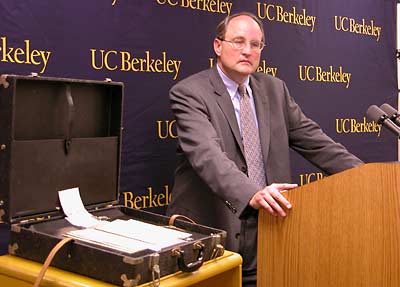 |
Political science professor Henry Brady next to one of the first Votomatics, which was developed here at UC Berkeley. (Steve McConnell photo) |
Court decision to delay recall election justified by concern over punch card ballots, expert says
BERKELEY - "Punch cards throw away votes," said UC Berkeley professor Henry Brady in a September 15 press conference held just hours after a federal court of appeals ruled that California's Oct. 7 gubernatorial recall election should not proceed until the entire state had replaced punch cards with modern voting systems. "People come to the polls; they mean to vote; they intend to vote; they try to vote; they make a mark on the system trying to vote, but the system does not record their vote. "
| More from Henry Brady Testimony in the recall election challenge lawsuit: • Adverse impact of punch-card voting on minorities • Response to challenges to Brady's testimony Transcript of 9/15 press conference |
At the press conference, Brady first demonstrated how a punch card ballot works, using a Votomatic, one of the original punch-card voting systems. He noted that the Votomatic was patented in the early 1960s by UC Berkeley political science professor James Harris, who had invented the basic punch-card system some three decades earlier. With punch-card systems like the Votomatic and Pollstar, voters use cards pre-scored with small, perforated rectangles - the infamous "chads." Voters insert the card into the voting device with the candidates' names, and use a stylus to punch out the chad for their preferred candidates. However, nowhere on the ballot do the candidates' names appear, making it impossible for voters to check their work, said Brady. And unlike electronic voting systems, which resemble ATMs, or optical scan systems that many people have used for standardized tests, there "is nothing in everyday life like the punch card," he said.
Brady pointed to a chart showing the "residual vote rate" in California for the 2000 election, explaining that punch cards result in a residual vote rate of between 2 and 2.5 percent, versus less than 1 percent for optical scan, touch-screen, and Datavote systems. "Residual votes" refers to undervotes - for example, cases in which the chad has not been punched all the way through, as well as overvotes - cases in which the voter has mistakenly punched the box for one candidate and "corrected" his or her mistake by later punching the box for another. Neither undervotes nor overvotes are counted, said Brady.
Since six California counties that account for 44 percent of voters registered in 2000 use the antiquated punch-card system, that residual vote rate could translate into roughly 44,000 lost votes for the October 7 election - five times as many votes as were in dispute in Florida during the 2000 Presidential election, Brady noted.
Central to the debate over the punch-card counties was the fact that they include several with a high percentages of minority residents, such as Los Angeles. Brady said that his studies had found that while punch-card ballots increased the number of over- and undervotes for all ethnic groups, they did so even more significantly for minorities. But when Fresno County switched from a punch card to an optical scan system in 2000, Brady said, instead of having high levels of residual votes, especially in minority neighborhoods, suddenly the situation levels out for all neighborhoods.
"I've done this study again and again with different counties, and again and again I find the same patterns," Brady stated. "Get rid of punch cards, and the residual vote rate goes down and we throw away fewer votes. That's good for democracy. That's equal protection for votes, which was at the center of this law case. What the court did was say we have two competing interests here. One is the timeliness of elections. We all want to have the election as soon as possible and get it over with. On the other hand, we want to make sure that we're not throwing away people's votes."
By March 2, 2004, the date on which the California presidential primaries will take place, all California counties will have transitioned to more modern voting systems as mandated by separate litigation in an earlier court case.
The 9th Circuit Court's decision to postpone the October 7 recall election is expected to be appealed to the U.S. Supreme Court.

